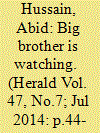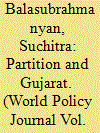| Srl | Item |
| 1 |
ID:
132221


|
|
|
| 2 |
ID:
187442


|
|
|
|
|
| Summary/Abstract |
Scholars have paid significant attention to the linguistic reorganisation of states in India but there is less consideration of how the demands of linguistic movements to redraw the map of India is linked to the history of partition across the colonial-postcolonial divide as well as of the new minorities that linguistic states created. This article draws attention at first to the unsuccessful pre-partition resistance of Sindhi Hindus to the separation of Sindh from the Bombay Presidency on linguistic lines as separation would make them a religious minority. The article then discusses Sindhi resettlement in India as deterritorialised partition refugees, when they had to claim belonging in the context of reinvigorated calls for the redistribution of boundaries based on linguistic majorities. As an alternative to territorial representation, Sindhi refugees successfully sought inclusion in the Eighth Schedule of the Constitution of India, a list of officially supported languages meant originally to enrich Hindi. This history reveals how partition and partition's refugees reshaped constitutional conceptions of minority citizenship in a manner not yet acknowledged. The inclusion of Sindhi in the Eighth Schedule transformed the Schedule's primary purpose from that of augmenting Hindi to additionally conferring protections to a group of minority languages. The Sindhi demand for inclusion paved the way for other minorities whose linguistic identity did not necessarily map neatly on to a geographically defined state to claim recognition in the Schedule. This opened a new but limited option for constitutional safeguards for linguistic minorities without a linguistic state in India.
|
|
|
|
|
|
|
|
|
|
|
|
|
|
|
|
| 3 |
ID:
109006


|
|
|
|
|
| Publication |
2011.
|
| Summary/Abstract |
Compared to Punjab and Bengal, Gujarat's experiences of the Partition of India in 1947 remain curiously under-researched even though the state has a long border with Pakistan and over a million people migrated to Gujarat, mostly from neighbouring Sindh. This paper seeks to fill this lacuna in Partition scholarship by examining the experiences of two Hindu groups, Sindhis and Gujarati Dalits, who left Sindh to settle in Ahmedabad. Drawing on the oral testimonies of migrants, the paper shows that while the official logic of Partition might have been predicated on irreconcilable religious identities, the actual experience of Partition brought into play multiple identities arising from regional, caste and community affiliations as well as gender, which migrants drew on in order to cope with the upheaval caused by Partition.
|
|
|
|
|
|
|
|
|
|
|
|
|
|
|
|